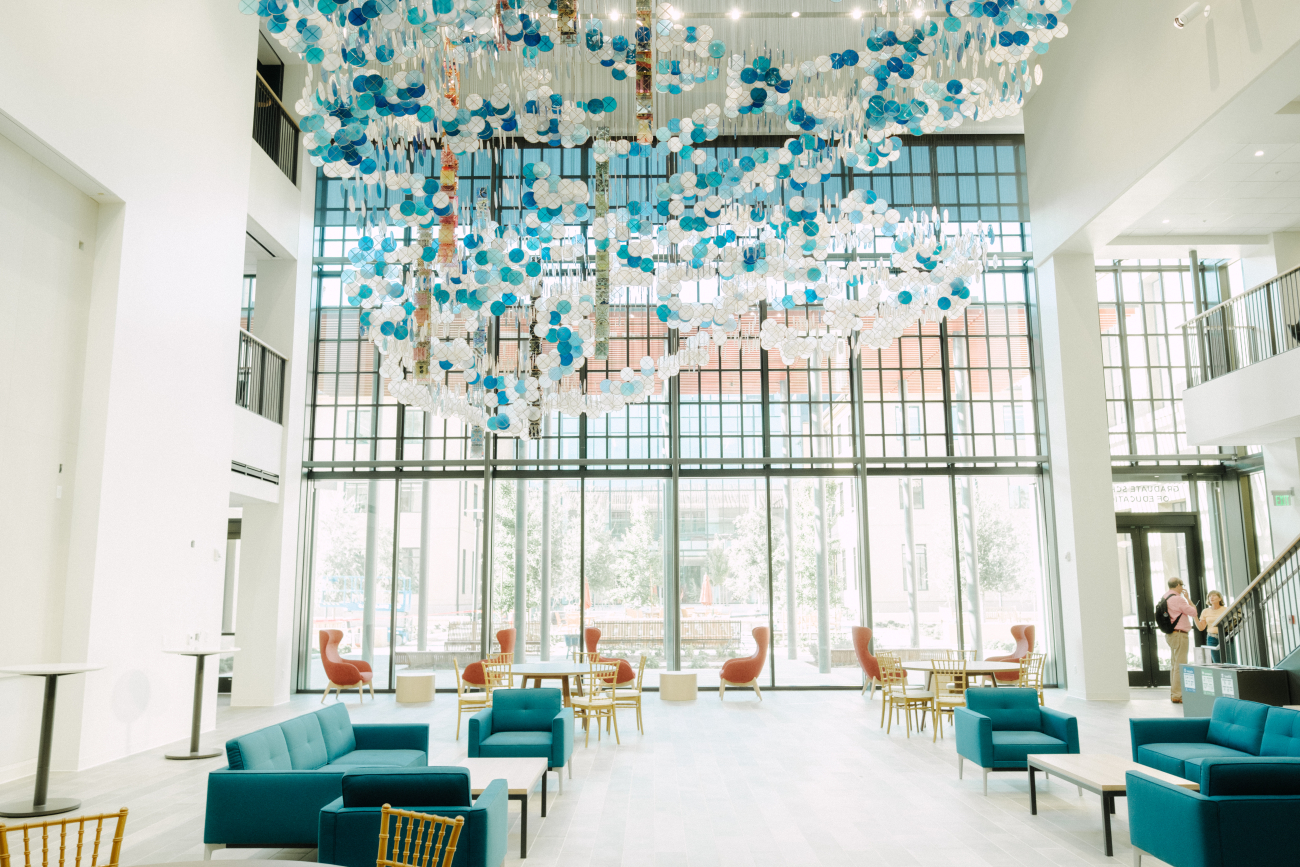
The sky’s the limit: Art installation inspires curiosity and creativity in education
Walking into the first-floor Forum of the remodeled and newly named Angela Nomellini and Ken Olivier (ANKO) Building at Stanford Graduate School of Education (GSE), you find a few things you would expect: modern furniture, a stairway that leads to light-filled classrooms and offices, and a medley of staff, students and faculty as they acclimate to the recently opened space.
Look up, though, and you might be surprised to find a constellation of kites that seem to float in a soft, cloud-like formation of white and blue. Both suspended in space and somehow hinting at movement, the GSE’s new art installation, The Gravity of the Sun, invites onlookers to stop, stare, and ask questions — a characteristic that artist Jacob Hashimoto says is by design.
“Once you start asking questions, you put yourself in a position where you’re activating the art,” Hashimoto said in a recent interview from his studio in Ossining, New York. “But if you’re just assuming knowledge about something, then you’re not engaging with it.”
Beautiful building blocks
Starting the art installation, like many projects at the GSE, was a learning process for Hashimoto and his team at Superabundant Atmospheres, the art production company he co-founded with Wade Cotton and Jamisen Ogg.
“When creating this piece for the GSE, we wanted to create an artwork that spoke about teaching, the transfer of knowledge from people to each other, and from people to themselves,” said Cotton, an architect and art installer.
Made from handmade washi paper and supported by thin bamboo frames, the installation includes circular blue and white kites, as well as square graphic kites, each with colorful designs that connect to teaching and learning. Overall, the kites represent play and possibility, and a mix of culture, history, and knowledge.
Hashimoto drew inspiration from symbols and shapes found throughout history, like the Dharma wheel and old maps, to show how people understand the world.The kites are layered in resin, making them look almost weightless, and they let light shine through like stained glass, adding to the dreamlike quality of the piece.
The entire installation — which is made up of 6,500 kites strung up on 17 miles of spectra thread — spans 20 feet vertically, weighs just over 2,600 pounds, and hangs 12 feet from the floor at its lowest point.
“Once you get to know the piece, it’s clear that it’s a very complex result of simple repetitive actions,” Cotton said. “These are very simple objects, hung simply from the ceiling, with thread, placed very carefully, over and over again. And I think the handmade feeling of that is palpable. I think people will react to that.”
Creative collaboration
The GSE art committee, which included students, faculty, and staff, first awarded Hashimoto and his team the contract to create The Gravity of the Sun in May 2020. While the pandemic slowed production, it did nothing to dim zeal for the project, which is part of Stanford’s ongoing efforts to foster dynamism, aesthetic investment, and creative vitality across the campus.
"I really appreciated the GSE’s commitment to using commissioned art,” said David Lenox, university architect and director of campus planning at Stanford, who co-chairs the university's Public Art Committee with Vice President for the Arts Deborah Cullinan. “This started five years ago, so this was before we had spheres in the engineering quad or artwork in the Computing and Data Science building, so the GSE was out in front with a commitment to do something important with art.”
The first iteration of the design consisted of mainly white and clear kites, but after input from the committee, which sought a colorful centerpiece for the school, Hashimoto and his team transformed it into a celestial transition from white to blue, creating an effect reminiscent of the marine layer rolling into the San Francisco Bay area.
“The Gravity of the Sun is a dynamic piece in a dynamic school. It adds a sense of wonder and possibility, sparks conversations, and invites people in,” said Dean Dan Schwartz. “That’s what we wanted for the space – and it really shines.”
Meaningful meandering
Hashimoto says a big influence for how he approached the piece from an education standpoint was his father Irvin Hashimoto, a retired English professor.
“I grew up in a household that was very concerned about how we teach and learn,” said Hashimoto, whose father and grandfather both graduated from Stanford. “My father is in his 80s now and currently learning how to play the violin, and he’s still obsessed with how he’s learning and what it means.”
He says his father instilled in him a firm belief in the importance of the liberal arts, nuance, and meaningful meandering in education.
“My father used to do geometry homework with me, and we would do these super long and inefficient proofs to get to the answers, rather than the way we were supposed to according to the textbooks,” Hashimoto said. “I learned a lot more through that process because I was challenged to meander my way there.
“Similarly in education, I hope there’s room for meandering because I think it makes a difference,” he said. “If you can get people to start asking questions of themselves, then you’ve achieved what I think is the foundation of education – curiosity.”
Faculty mentioned in this article: Dan Schwartz



